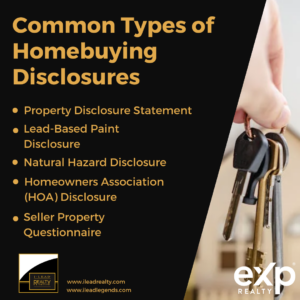By: Jerika P – i-Lead Realty Social Media Manager

Homebuying disclosures are legal documents that provide essential information about the condition and history of a property. They are typically offered by the seller or the seller’s agent to the buyer during the home-buying process.
Here are some common types of homebuying disclosures:
1. Property Disclosure Statement
This document provides information about the condition of the property, including any known defects, repairs, or upgrades that have been made. It may also include information about the property’s age, the roof’s condition, the foundation, the electrical and plumbing systems, and other key features.
2. Lead-Based Paint Disclosure
If the property was built before 1978, the seller or seller’s agent is required by federal law to provide a lead-based paint disclosure. This document provides information about the presence of lead-based paint in the home and any known hazards.
3. Natural Hazard Disclosure
This document provides information about natural hazards that may affect the property, such as earthquakes, floods, wildfires, or landslides. It may include maps, reports, and other information about the risk of these hazards.
4. Homeowners Association (HOA) Disclosure
If the property is part of a homeowners association, the seller or seller’s agent is required to provide an HOA disclosure. This document provides information about the rules, regulations, and fees associated with the HOA, as well as any pending lawsuits or other issues.
5. Seller Property Questionnaire:
This document provides a comprehensive list of questions that the seller must answer about the property. It may include questions about the history of the property, the condition of the home and yard, the age and condition of appliances, and other relevant information.
It’s important for homebuyers to review and understand all of the disclosures provided before making an offer on a property. If you have any questions or concerns about the disclosures, be sure to discuss them with your real estate agent or attorney.
If you are searching for a Real Estate Professional or would like to learn more, you can contact us here.
Not sure if you want or need to use a realtor? Here are 4 reasons why you should. Watch the video here

